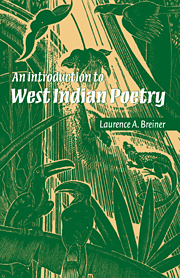Book contents
- Frontmatter
- Contents
- Preface
- Chronology for Anglophone Caribbean poetry
- Map of the Caribbean
- 1 West Indian poetry and its audience
- 2 The Caribbean neighborhood
- 3 Overview of West Indian literary histories
- 4 The relation to “Europe”
- 5 The relation to “Africa”
- 6 The relation to “America”
- Notes
- Guide to further reading
- Index
4 - The relation to “Europe”
Published online by Cambridge University Press: 06 January 2010
- Frontmatter
- Contents
- Preface
- Chronology for Anglophone Caribbean poetry
- Map of the Caribbean
- 1 West Indian poetry and its audience
- 2 The Caribbean neighborhood
- 3 Overview of West Indian literary histories
- 4 The relation to “Europe”
- 5 The relation to “Africa”
- 6 The relation to “America”
- Notes
- Guide to further reading
- Index
Summary
This chapter traces the separation of West Indian poetry from English poetry, a process which gets under way in the nationalist period. The process is not strictly sequential, though there is an apparent logical succession to the array of strategies by which poets work out their relation to “Europe”: successful imitation or assimilation, uneasy divergence, asserted difference. While this separation is analogous to the earlier rejection of “tracing-paper poets” by nationalists elsewhere in the Caribbean, the best-articulated conceptual model is probably that provided by Houston Baker's analysis of the corresponding phase in African-American literature. Acknowledging that the Harlem Renaissance movement (like earlier West Indian poetry) has been severely criticized for its advocacy of “the standard,” by which he means the norms of received literary practice, Baker argues that such formal mastery entails an element of “masking.” “Such masking carries subtle resonances and effects that cannot even be perceived (much less evaluated) by the person who begins with the notion that recognizably standard form automatically disqualifies a work as an authentic and valuable Afro-American national production.” The model here is close to that of apprenticeship, the assimilation of traditional craft demonstrated in a culminating masterpiece which earns entry into the guild. But there is more to it than that. For Baker, “the mastery of form” makes possible – and legitimizes – what he calls “the deformation of mastery.”
- Type
- Chapter
- Information
- An Introduction to West Indian Poetry , pp. 104 - 140Publisher: Cambridge University PressPrint publication year: 1998



